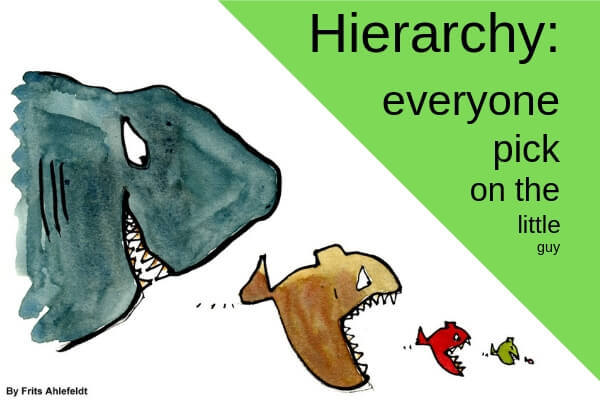
YouTube / iTunes / Spotify / Radio Public / Pocket Casts / Google Podcasts / Breaker / Overcast
Listen to ArtisanEnglish.jp posts & lesson intros here.
Word of the Day: Hierarchy
It’s intriguing how the hierarchy of the food chain matches the authority of human society.
A hierarchy is a system in which things are arranged according to importance. The stronger / bigger something is, the more important it is.
In both systems, things are arranged according to how important they are.
Usually, the stronger or bigger something is, the more critical it is.
In the food chain, the big fish eat the little fish, and the little fish eat whatever they can.
In the human world, the rich and powerful can do whatever they want.
While they do, the poor and weak can’t do anything at all.
This is not the real story, though.
The big fish eat the little fish, that’s true.
If the little fish were to disappear, what would happen then?
The big, powerful fish depend on the small fish as their food source.
In other words, the hierarchy should be the other way around.
The little fish should be more important.
They don’t necessarily need the big fish, but the big fish depend entirely on the little ones.
Can we apply this theory to the human food chain?
I think we can.
Influential politicians and business people are only important because the average Joe has made them important.
We vote with our ballots and our wallets.
A king without subjects is not a king.
He’s just an idiot who thinks he’s important.
In today’s social hierarchy, the rich get richer, and the poor get poorer.
Eventually, the poor people will have very little money.
Remember, the big fish depend on the small fish.
In just the same way, politicians and business people need the votes and purchases of the poor to maintain their position.
They depend on us.
Plain and simple.
Hierarchies resemble pyramids with a broad base and a pointy top.
If the bottom gets weak, the pointy top falls.
Flesch-Kincaid Readability Test
This post is understandable by someone with at least a 7th-grade education (age 12).
On the Flesch-Kincaid reading-ease test, this post scores 74.
The easier a passage is to read, the higher the score on a scale of 0 – 100.

